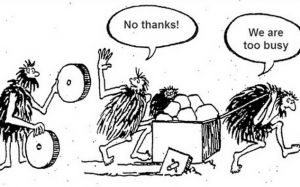 I have been telling you, telling my students, telling my clients, that you hear what I say… approximately. You follow instructions… approximately. You read… approximately. You keep your diet… approximately. You live… approximately.
I have been telling you, telling my students, telling my clients, that you hear what I say… approximately. You follow instructions… approximately. You read… approximately. You keep your diet… approximately. You live… approximately.
You only got up this morning because you didn’t die the night before.
I am re-reading The Baroque Cycle by Neal Stephenson. 2600 pages… What can I say, I like long books. lol.
I have started to check every word in the kindle’s built in dictionary some time ago. Maybe a year ago, maybe two. I originally read the Baroque Cycle four years ago.
The book has plenty of words I needed to check. And to my dismay, I found that the first time around I only understood what happened… approximately.
Approximately is missing 90% plus of what you read, and you are left with the inconsequential 10%. The stuff you already knew. The gossipy stuff. The mundane stuff. The stuff that allows you to remain the same, your worldview to remain the same.
It looks like you work hard, but the results are not forthcoming. You are in the hamsterwheel, making the rounds… nothing new is ever happening.
One of my students just wrote, this morning, that the voices say: unless it’s hard, it’s nothing. Unless it’s hard you are not earning it. It has to be a struggle. 1
But, of course, if you listen to the voices as truth-sayers, you’ll spend most of your energies in pretense: it is hard… “see mom how good I am, I am working really hard.”
I have found that the experience of hard is experiencing your resistance.
There is never any hard in reality. The hard is doing the thing that is easy plus your resistance. One foot on the break, one foot on the gas.
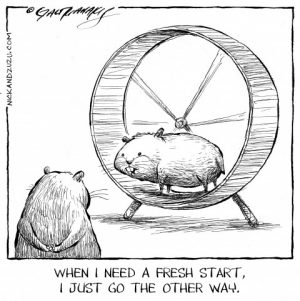 Heavy? yes, there is heavy. If I went down and tried to shovel the almost two feet deep wet snow, I would experience heavy. So I would shovel it in layers… and not hurt my back. 2 Heavy is a comparison, but it is real… weight is real. Hard is an opinion.
Heavy? yes, there is heavy. If I went down and tried to shovel the almost two feet deep wet snow, I would experience heavy. So I would shovel it in layers… and not hurt my back. 2 Heavy is a comparison, but it is real… weight is real. Hard is an opinion.
It would be done, the shoveling… Not approximately, but fully.
I watched a few videos yesterday with my favorite marketing teacher. He is the master of doing things slowly and fully by slicing them, like I would slice the snow.
Doing easy things easy by doing them one slice at a time.3
If the system is sound, if the context is healthy, his method of slicing makes for an easy life… great results, lots of customers, steady high income, because he does the things other people procrastinate about because it’s hard.
His vibration is 260.
What is his secret? I would guess: He hears the voices but he doesn’t consider that those are his thoughts.
The voices may say: unless it is all done it is not done. or unless it is perfect it is no good.
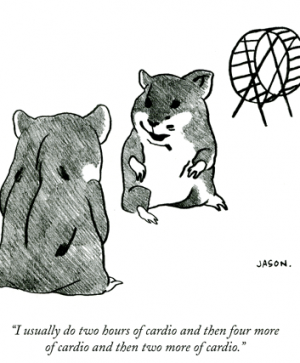 He sees the voices for what they are: the enemy. The misdirection. The ropes that try to keep you down… made audible. (see: Gulliver’s Travels)
He sees the voices for what they are: the enemy. The misdirection. The ropes that try to keep you down… made audible. (see: Gulliver’s Travels)
Some of my favorite movies are where the hero is constantly bombarded by friends’ voices to slow down, to change, to give up, to “not go there”… and, of course, they don’t listen.
Kabbalah calls the voices, whether they are disembodied and sound like you, or come through other people’s mouths, The Opponent.
Society trains you that it is impolite to not listen to someone who speaks.
I am rude. I interrupt… or plug my ears…
The 99% principle from Tai’s 67 Steps is quite accurate: don’t listen to 99% of the people, but when you find the one who knows, listen with all your might, break out the dictionary if needed, take notes, and listen closely. Not approximately.
You are democratic in your listening, and you listen to everyone. And then you are surprised that your life is not amounting to anything.
 From the way people talk to me, most people, I know that they consider me democratically… and they listen to me with as much humility as they listen to everyone else. It’s obvious to me, probably because I not only see the style, but I also feel them.
From the way people talk to me, most people, I know that they consider me democratically… and they listen to me with as much humility as they listen to everyone else. It’s obvious to me, probably because I not only see the style, but I also feel them.
Democracy is a system where everyone’s voice counts equally.
With the internet, we are talking about millions of voices… so how do you filter out the 99% that you should not validate with your listening: the voices, the Opponent, The Enemy, the Dark Side?
Without training YOU don’t. And your life, your inner environment is a reflection of that: you are miserable, and that is that.
You don’t have to know a little bit about a lot of things.
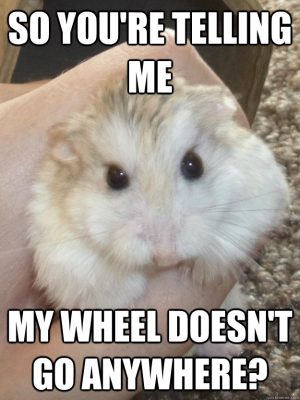 People who are less unhappy, who spend at least some of their lives in fulfilling work, have the opposite approach to knowledge.
People who are less unhappy, who spend at least some of their lives in fulfilling work, have the opposite approach to knowledge.
They go deep. They close their ears to everything else…
My interest is people. The inner dynamic of people. I am only interested in physics, or anything else to the degree it is connected to the inner dynamic of people.
I have learned that psychologists are like Plato’s cave dwellers:
they can’t see what is happening, they only see the shadows of what is happening: open to misinterpretation.
So I don’t read psychologists, or if I do, I read to remind myself to deal with the cause, not the effect. Or to ask more and different questions: the questions maybe good to ask. But I don’t see the validity of their theories, so I don’t read them to learn from them. They are still part of the 99% I ignore.
I listen to Tai Lopez daily… not to learn from him, but to be taken to questions I haven’t considered.
I am interested in health, because someone not healthy, someone not well will be people who are not well… a dynamic that causes people to be even more errant than a not-ill person.
I don’t read doctors. I don’t read nutritionists. I don’t read PhDs prattling about DNA and such. They are, just like psychologists, reading tea leaves… the shadows of reality, not reality itself.
Instead, I go deep, and look there. I also find inspired novelists who get closer to what is the truth than “scientists” can… like learning how Epigenetics looks, like feels like… inside. (Seveneves by Neal Stephenson)
Causing Epigenetic Shift for yourself
Then I find the people who did it… like my father. Like Robert Plank.
Not hearing the voices as if you were speaking requires an epigenetic shift.
Doing the Amish Horse Training Method, approximately, will not cause epigenetic shift…
Redirecting your energies to what is at hand, instead of what you dream about, requires you to cause an epigenetic shift: activate a spiritual capacity.
I said at the beginning of the article that nothing is hard in reality. And that is still true.
But…
But causing an epigenetic shift, which is in effect when you raise your vibration! When you turn on a capacity! that is as close to hard as it comes.
You have to push through some invisible barrier.
I have written about my deadline type of occupations before.
- When you need to work for four-five-six days without even taking a nap…
- When you need to keep on walking, or running, even though your legs cannot hold any longer…
- When you need to keep your attention on what you are doing in spite of all the noise of the voices…
If you believe that everything is hard, or everything needs to be hard, or the b.s. the voices say, then you won’t ever get to what is as close to hard as it can ever get: causing an epigenetic shift for yourself.
Checking every word I don’t know, or I don’t EXACTLY know, comes hard to me. Having done it on books where the happening is interesting or exciting, doesn’t come easy to me. I’d rather be swept away by the story.
Being willing to do it (and I have even started doing it when I read online, and the dictionary is not that easy to reach), has caused an epigenetic shift for me.
If the word “discipline” weren’t as misused as it is, I would say that I am talking about discipline. But instead of using that word, I am going to go and be specific, instead.
Returning your attention to what you are doing, diligently and fast… for example, is a great way to show what is there to do.
Reclaim your role as “master” or “boss”, who calls the shot, where you can direct your attention, move your muscles, keep your brain alert, do what you said you would do… exactly…
Sounds hard, sounds impossible, and sounds like you cannot do it.
There is no “cannot” that is valid. If someone else has done it, you can do it. The question is: will you?
The reason the voices say “hard” to discourage you from doing things that would make a difference, to tell you “don’t even go close”… or alternatively so you pretend that it’s hard, so you can have an excuse that you didn’t do it.
- Colin Wilson, a now dead British writer, opened up an epigenetic shift when he was practicing going into superconsciousness.
- Matsa, my first student, opened up an epigenetic shift when she learned to consistently shift out of the mind and connect to Source. I did a lot of one-on-one sessions with her on this: I can tell you, it wasn’t “natural” for her, but she did it.
- In a course where I was teaching stepping back, several students created an epigenetic shift…
- Einstein created an epigenetic shift when he stuck with a thought process he was working on in the bathtub, even though the bath water was already cold.
I am still working on an epigenetic shift to take the time to see beyond the surface before I take an action… it’s slow going, and I have a huge resistance.
Yeah, the hard is breaking through your own resistance.
The selfish genes that are in ess, want to continue easy. “Natural.” And have been keeping humanity at the level where we are: hardly any human being capacities are open in hardly any humans.
Do you think Bill Gates enjoyed getting up at 3 am to go to the computer lab? Think again. His growth can be directly traced to that “breaking through his inner resistance” act.
And he didn’t do it once… He did it for years… At 3 am he didn’t have to pay for the lab time, because no one used the lab at that time.
You cause an epigenetic shift when you are willing to go toe to toe and win over a “natural inclination.”
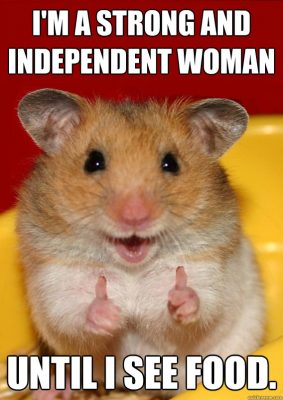 Thinking only of yourself, being delusional about who you are, taking things personally, never risking to be found out, never finishing anything, living in your head, eating what’s in front of you, staying up late, being scattered, desire trap, being cowardly, bragging, judging, comparing, daydreaming, complaining…
Thinking only of yourself, being delusional about who you are, taking things personally, never risking to be found out, never finishing anything, living in your head, eating what’s in front of you, staying up late, being scattered, desire trap, being cowardly, bragging, judging, comparing, daydreaming, complaining…
Just a few of your natural inclinations.
Start with one. May I recommend that you start with the Amish Horse Training Method?
I am going to teach it in webinars. The first session is tomorrow, Sunday March 4 at 4 pm my time.
I will open up the session for every subscriber… I just decided it, just now. I’ll send an email as soon as I publish this article… in a few minutes.
Six people have paid… and I will work with those six, but you can be there, hear, see, and witness.
Why am I doing this, opening up a paid course to people who don’t want to pay?
Because I want to expand the number of people I can observe.
Here is an anecdote I have learned a lot from: A famous composer is working on a violin sonata. An equally famous violin virtuoso goes and visits the composer, and gets the notes of the piece. He has two weeks to prepare for the grand event, when the piece will be introduced to the public.
After a week the violinist goes back to the composer, and say: this piece cannot be played, and throws the notes on the piano.
The famous composer says: I am not interested in it being played, I am interested what it sounds like when someone tries to play it.
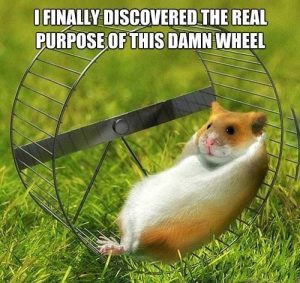 The Amish Horse Training Method is much like that violin sonata… and I am interested what it looks like, what it feels like, as you are trying to train your inner horse to hear the voices as voices, not his own thoughts.
The Amish Horse Training Method is much like that violin sonata… and I am interested what it looks like, what it feels like, as you are trying to train your inner horse to hear the voices as voices, not his own thoughts.
Each time I do something like this, some little corner of misunderstanding, reveals itself.
My goal is to make the method doable by anyone who is willing.
As long as you hear the voices as important, you will not be able to cause an epigenetic shift for yourself in anything. And you’ll remain in Plato’s cave, a dreadful, fearful, dark place.
The high achievers, like Bill Gates, caused themselves to not listen to the voices… They had something that was more important than “obeying” the voices.
You, probably, don’t. So you need a training.
I did it, so you can too. Anything anyone did is proof that it’s not impossible.
I don’t compare myself to those high achievers… because I don’t know how they did it. So maybe they were born that way.
But I had to go through what YOU have to go through. And I did it.
It took me decades. With proper guidance, it may take you less time.
Of course you cannot listen and cannot do approximately… That is the death of anything worth hearing or doing.
Maybe the biggest crime perpetuated on humanity by the voices.
- Just a by the way: look at the mice in this video… They are unwilling to run in the direction the wheel is going… each wants to control nature… Recognize yourself?
- I am this 5’3 70 year old woman… What is heavy for me may not be heavy for Arnold Schwarzenegger…
- I just came back up, after I did exactly as I said… shoveled the knee-deep wet snow, one slice at a time. It felt good. It felt right. And I was a little tired for a few minutes as I came up.
Did I have to shovel the snow? No. But I have a commitment to you not to teach anything Tree of Knowledge… Now, after I did it, it is Tree of Life knowledge: authentic.

Yes, it does make sense! It is clear now.
Thank you. I’m now off to bed to implement it in reading Cryptonomicon.
three of us are reading Cryptonomicon now… Kawa, you, and me… splendid.
Thank you for this, Sophie.
I feel like our last conversation during the recent webinar created an opening for me, that may turn into an epigenetic shift, if I keep doing the work.
But this particular article fueled my ambition for becoming a deep knower of words and languages… this is new for me, but I think I am willing to work on it daily – and checking the meanings of words I don’t know EXACTLY in the dictionary is a big part of it. Also, studying philosophy seems compatible with that, so I’m going to stay at the university for now.
I have one question though: I’ve been practicing reading not-for-understanding, and I’d like to start checking words I don’t know in the dictionary – but these two practices seem contradictory. Should they be done separately, especially by a beginner? How do you do it, Sophie?
When you read for understanding, you think understanding is the goal. But it is just one possible goal. Understanding is the booby prize… mind knowledge.
You can read, like I do, for enjoyment, for getting to see people and archetypes, and stuff… But if I don’t know a word, it cannot talk to me. So even though i don’t read for understanding, I need to fit that word to have a coherent picture… instead of a picture with blank blobs in the middle.
The difference is where you process what you read. I don’t read with the mind… so I check words not from the mind. I make no effort to remember the word either. I read what the dictionary says, I go back and check if I can see the picture the sentence is creating. If yes, I am happy, and continue reading…
Unless you can tell the difference between the mind and outside of the mind, you need to do the Amish Horse Training Method.
The mind is Plato’s cave… where you are not interfacing with reality: your sense organs only see the interpretation of reality… aka shadows… narration… meaning… story… your opinion…
I hope this makes sense.
And I am really grateful that you listened such that allowed me to make a difference. Thank you.